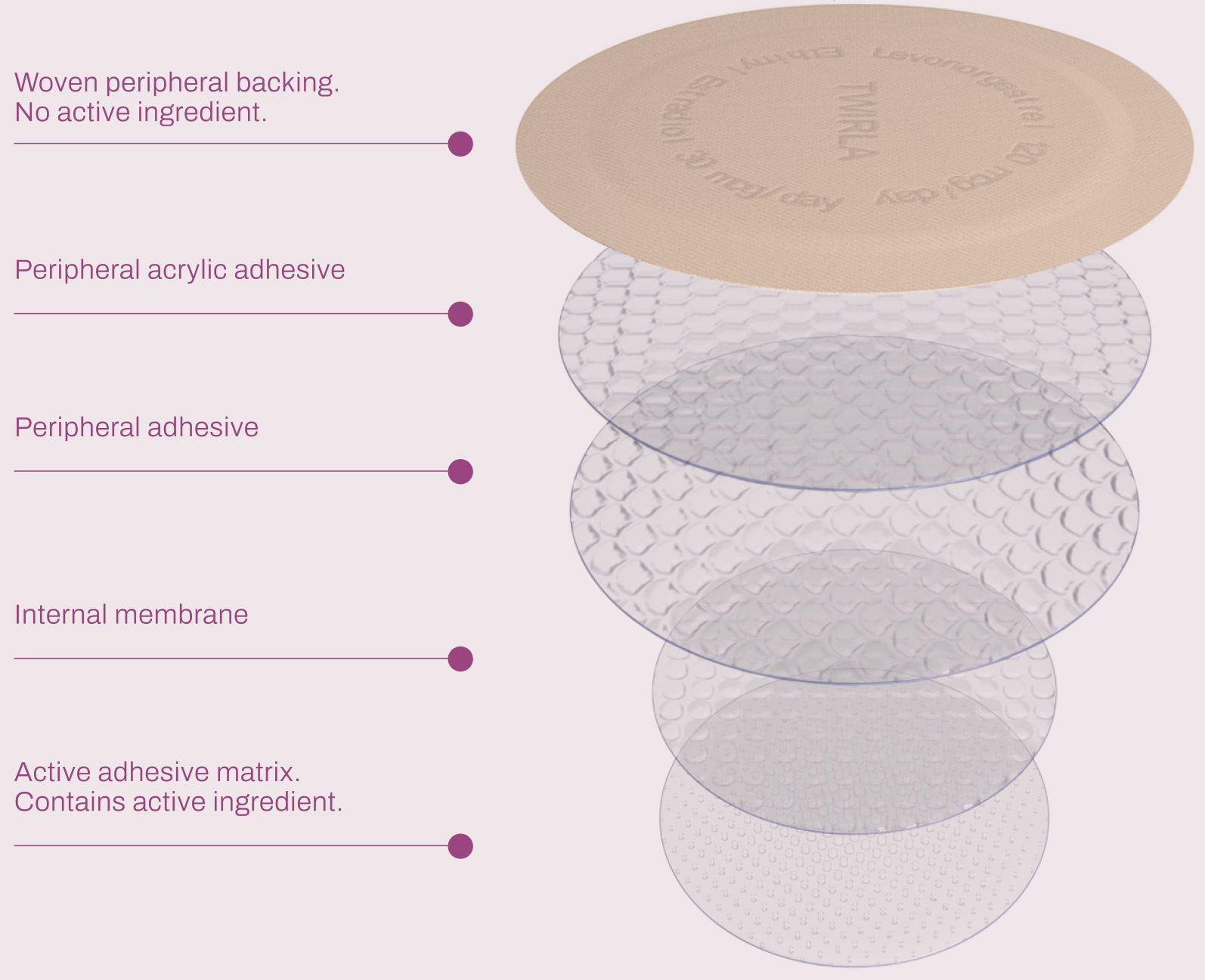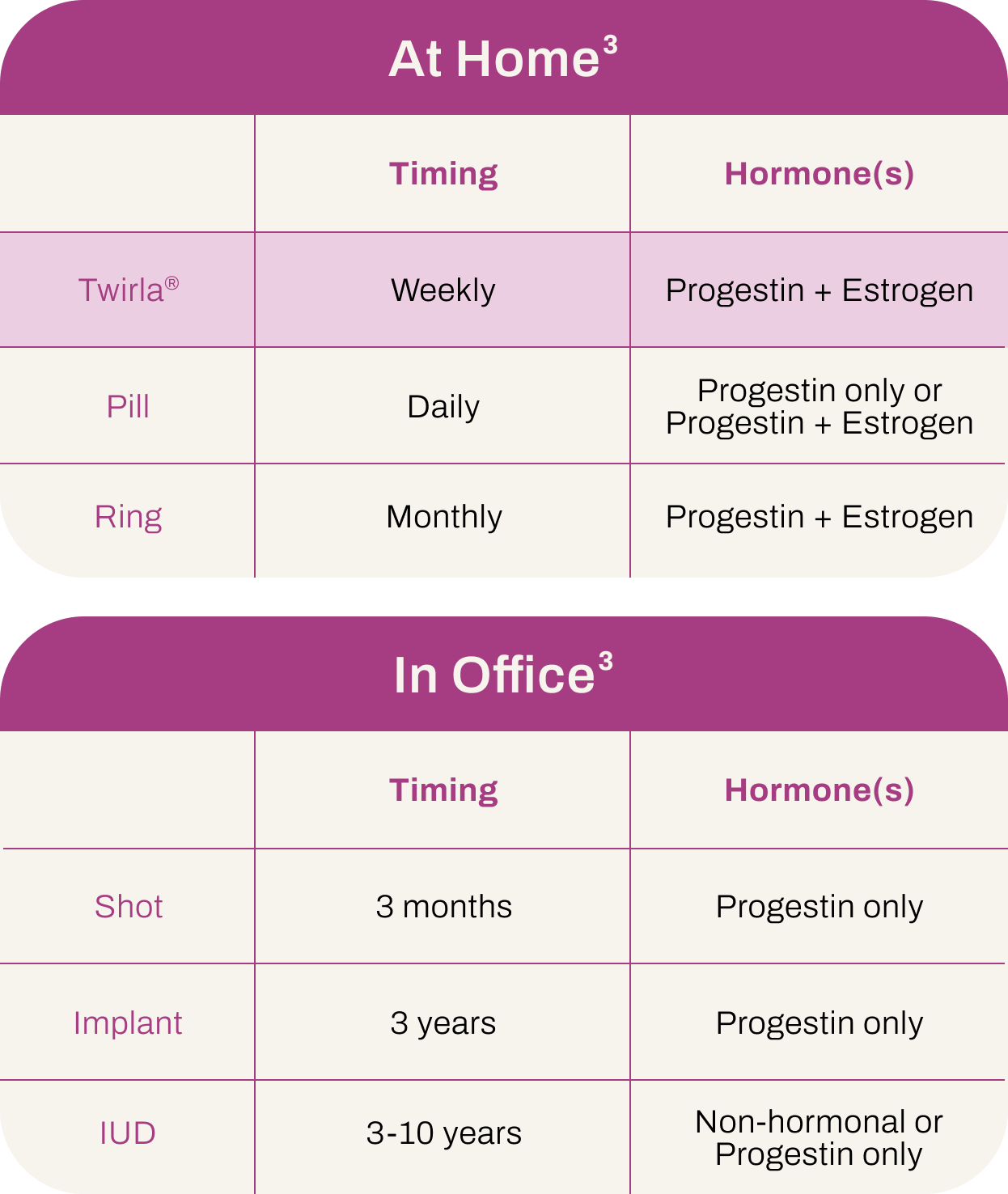Do not use TWIRLA if you:
- smoke and are over 35 years old
- have or have had blood clots in your arms, legs, eyes or lungs
- have had a stroke
- have had a heart attack
- have certain heart valve problems or heart rhythm problems that can cause blood clots to form in the heart
- have a problem that makes your blood clot more than normal
- have high blood pressure that is not controlled
- have diabetes and are over the age of 35, have high blood pressure or have kidney, eye, nerve, or blood vessel damage, or have had diabetes for more than 20 years
- have had certain kinds of severe migraine headaches or have any migraine headaches if you are over age 35
- have a BMI of 30 kg/m2 or more
- have liver problems including liver tumors, hepatitis, cirrhosis, or liver disease
- have unexplained vaginal bleeding
- are pregnant or think you may be pregnant
- have had breast cancer or any cancer that is sensitive to female hormones
- are allergic to any of the ingredients in TWIRLA
- take any Hepatitis C drug combination containing ombitasvir, paritaprevir, ritonavir, with or without dasabuvir as this may increase levels of a liver enzyme in the blood
TWIRLA may not be a good choice for you if you have ever had jaundice (yellowing of the skin or eyes) caused by pregnancy or related to previous use of hormonal birth control.
Tell your healthcare provider if you have ever had any of the above conditions. Your healthcare provider may recommend another method of birth control.
TWIRLA may cause serious side effects, including:
- blood clots
- liver problems, including liver tumors
- high blood pressure
- gallbladder problems or worsening of a gallbladder problem you already have
- headaches
- irregular or unusual bleeding and spotting or absence of menstrual periods
- depression
- swelling of your skin, especially around your mouth, eyes, and in your throat
- dark patches of skin on your forehead, cheeks, upper lip, and chin
Most common side effects of TWIRLA include:
- skin reactions at the patch site
- nausea
- headache
- menstrual cramps
- weight gain
These are not all the possible side effects of TWIRLA. Talk to your healthcare provider for medical advice about side effects.
Tell your healthcare provider about all the medicines you take, including prescription and over-the-counter medicines, vitamins, and herbal supplements. Some medicines and herbal products may make TWIRLA less effective or cause breakthrough bleeding.
Use another birth control method (such as condoms, spermicide, or diaphragm) when you take medicines that may make TWIRLA less effective and for 28 days after stopping the medicine.
Tell your healthcare provider if you drink grapefruit juice, take lamotrigine, are scheduled for any laboratory tests, or on thyroid or corticosteroid replacement medicine.
If you are not sure if you take any of the medicines described above, talk to your healthcare provider.
What should I avoid while using TWIRLA?
- Smoking
- The following can cause the patch to not stick the right way making TWIRLA less effective:
- Avoid using makeup, creams, lotions, oils, powders or any other products on the skin area where you put or plan to put the patch.
- Swimming or contact with water often or for long periods of time (30 minutes or more). Talk with your healthcare provider about the best method of birth control if you are a swimmer or you often come in contact with water for 30 minutes or more.
- Women who tend to get chloasma should avoid spending a long time in the sunlight, tanning booths, and under sun lamps while using TWIRLA. Use sunscreen if you have to be in the sunlight.
You may report side effects to the FDA at www.fda.gov/medwatch or 1-800-FDA-1088, or Exeltis at 1-877-324-9349.
TWIRLA does not protect against HIV infection (AIDS) and other sexually transmitted infections (STIs).
What is TWIRLA?
TWIRLA is a birth control patch for women with Body Mass Index (BMI) less than 30 kg/m2 who can become pregnant. It contains two female hormones, a progestin called levonorgestrel, and an estrogen called ethinyl estradiol. Birth control methods that have both an estrogen and progestin are called combination hormonal contraceptives (CHCs).
TWIRLA is less effective in women with a BMI of 25 kg/m2 or more.
Please click here for Patient Information, including Most Important Information, for additional Important Risk Information.
References:
- Twirla Prescribing Information.
- Data on file.
- FDA. Birth Control Chart; 2024.





